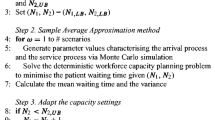Abstract
The proper management of patients’ waiting time requires the use of reasonable decision logic and tool. Simulation and optimization techniques can support management decisions to reduce the risk of the decision process by evaluating and analyzing various patient flow control strategies. The purpose of this study is to propose mathematical models and algorithmic frameworks to minimize the waiting time of patients and to determine the timing of the services of an emergency center. The patient scheduling problem is formulated as integer programming models, and the large instances of the problem are solved by Tabu search method and L-shaped algorithm. This cross-sectional descriptive study is conducted on 150 patients referred to the emergency department of a government hospital, and the required data are collected through a questionnaire. A discrete-event simulation model is also designed using the Arena software. According to the results of this paper, to reduce the waiting time of patients, execution of the triage process of patients in the emergency department, the use of an emergency medicine specialist for medical diagnosis and ordering the diagnostic procedures in the early stages of the process—as well as a specialist laboratory for emergency patients—are suggested to accelerate the hospital process. In the secondary work, we extended a first come first serve algorithm using a fairness ratio. The extended system prioritized the entry patients and separated non-urgent from others in terms of frequency. The result of the numerical experiments shows that the implementation of the system in five scenarios results in 11% decrement in operation time.







Similar content being viewed by others
References
Denton BT, Miller AJ, Balasubramanian HJ, Huschka TR (2010) Optimal allocation of surgery blocks to operating rooms under uncertainty. Oper Res 58:802–816
Batun S, Denton BT, Huschka TR, Schaefer AJ (2011) Operating room pooling and parallel surgery processing under uncertainty. INFORMS J Comput 23(2):220–237
Mancilla C, Storer R (2012) A sample average approximation approach to stochastic appointment sequencing and scheduling. IIE Trans 44(8):655–670
Saremi A, Jula P, ElMekkawy T, Wang GG (2013) Appointment scheduling of outpatient surgical services in a multistage operating room department. Int J Prod Econ 141(2):646–658
Dogru AK, Melouk SH (2019) Adaptive appointment scheduling for patient-centered medical homes. Omega 85:166–181
Srinivas S, Ravindran AR (2018) Optimizing outpatient appointment system using machine learning algorithms and scheduling rules: a prescriptive analytics framework. Expert Syst Appl 102:245–261
Deceuninck M, Fiems D, De Vuyst S (2018) Outpatient scheduling with unpunctual patients and no-shows. Eur J Oper Res 265(1):195–207
Jiang Y, Abouee-Mehrizi H, Diao Y (2018) Data-driven analytics to support scheduling of multi-priority multi-class patients with wait time targets. Eur J Oper Res. https://doi.org/10.1016/j.ejor.2018.05.017
Van de Vrugt NM, Luen-English ST, Bastiaansen WAP, Kleinluchtenbeld S, Lardinois WTP, Pots MH, Schoonbergen DJ, Hans EW, Hurink JL, Boucherie RJ (2018) Integrated scheduling of tasks and gynecologists to improve patient appointment scheduling; a case study. Oper Res Health Care 16:10–19
Jiang B, Tang J, Yan C (2019) A stochastic programming model for outpatient appointment scheduling considering unpunctuality. Omega 82:70–82
Harzi M, Condotta JF, Nouaouri I, Krichen S (2017) Scheduling patients in emergency department by considering material resources. Procedia Comput Sci 112:713–722
Denton B, Gupta D (2003) A sequential bounding approach for optimal appointment scheduling. IIE Trans 35(11):1003–1016
Hsu VN, de Matta R, Lee CY (2003) Scheduling patients in an ambulatory surgical center. Nav Res Logist (NRL) 50(3):218–238
Hans EW, Vanberkel PT (2012) Operating theatre planning and scheduling. In: Hall R (ed) Handbook of healthcare system scheduling. Springer, Boston, pp 105–130
Denton BT, Rahman AS, Nelson H, Bailey AC (2006) Simulation of a multiple operating room surgical suite. In: Proceedings of the 38th conference on winter simulation. Winter simulation conference, pp 414–424
Jebali A, Alouane ABH, Ladet P (2006) Operating rooms scheduling. Int J Prod Econ 99(1–2):52–62
Marcon E, Dexter F (2006) Impact of surgical sequencing on post anesthesia care unit staffing. Health Care Manag Sci 9(1):87–98
Denton B, Viapiano J, Vogl A (2007) Optimization of surgery sequencing and scheduling decisions under uncertainty. Health Care Manag Sci 10(1):13–24
Lamiri M, Grimaud F, Xie X (2009) Optimization methods for a stochastic surgery planning problem. Int J Prod Econ 120(2):400–410
Min D, Yih Y (2010) Scheduling elective surgery under uncertainty and downstream capacity constraints. Eur J Oper Res 206(3):642–652
Saremi A (2013) Mathematical programming enhanced metaheuristic approach for simulation-based optimization in outpatient appointment scheduling. Doctoral dissertation
Acknowledgements
The author gratefully acknowledges that the funding is supported by Medicine and Engineering Interdisciplinary Research Fund of (YG2013ZD05). The authors also thank the anonymous reviewer and editor for their insightful comments that have helped in boosting this paper significantly.
Author information
Authors and Affiliations
Corresponding author
Ethics declarations
Conflict of interest
The authors declare that they have no conflict of interest.
Additional information
Publisher's Note
Springer Nature remains neutral with regard to jurisdictional claims in published maps and institutional affiliations.
Rights and permissions
About this article
Cite this article
Ala, A., Chen, F. Alternative mathematical formulation and hybrid meta-heuristics for patient scheduling problem in health care clinics. Neural Comput & Applic 32, 8993–9008 (2020). https://doi.org/10.1007/s00521-019-04405-4
Received:
Accepted:
Published:
Issue Date:
DOI: https://doi.org/10.1007/s00521-019-04405-4




